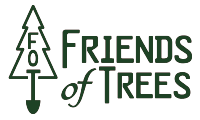Researcher calls FOT a “remarkable group”

Last Friday Portland City Club members met at the Governor Hotel to learn the social, economic and environmental benefits of trees in cities.
What the crowd of about 150 received from Kathleen L. Wolf, research scientist in the College of Forest Resources at the University of Washington, was an analysis of why the city of Portland and Friends of Trees are making urban foresters across the nation take notice.
“‘Oh, you’re from Seattle, well that’s near Portland; they’re doing some great things there,'” said Wolf, admitting that is a common comment she gets when giving speeches in other cities.
While some cities make broad proclamations, like New York’s effort to plant one million trees, Wolf said what Portland is attempting with its Grey to Green initiative (83,000 trees in five years) is a much more “reasonable and strategic approach.”
“The City of Portland recognizes just putting in those trees and walking away is not sustainable …”
While most cities in America are losing urban forest canopy, some at dramatic rates, Wolf said Portland has gained coverage in the past 30 years.
This was her lead-in for crediting the work done by Friends of Trees, which she called “a remarkable group, known not only regionally but nationally for what they do,” and they type of organization that is missing from Seattle’s urban forestry scene.
In particular, she noted the 375,000 trees planted by thousands of volunteers as a prime example of citizen ecology, something that her studies have shown is “profoundly important to our health.”
“The way individuals relate to nature is very important,” stressed Wolf in her closing remarks, “It’s not just about the trees, it’s about the people.”
–Toshio Suzuki
